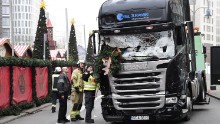The
man suspected of deliberately ramming a large truck into a Christmas
market in Berlin is a refugee from the Afghanistan-Pakistan region, two
German intelligence officials and a police official told CNN.
The
sources said the suspect in Monday evening's attack, which killed 12
people and injured dozens more, arrived in Passau, a city on Germany's
border with Austria, on December 31, 2015, after traveling through the
Balkans.
German
Chancellor Angela Merkel held a press conference on Tuesday saying it
would be "especially disgusting" if the suspect turned out to have been
given asylum in Germany.
Berlin police said that the truck "was
steered deliberately into the crowd." It was carrying 25 tons of steel
at the time, the vehicle's owner said.
The truck that devastated the Breitscheidplatz market is owned by a Polish company.
Ariel
Zurawski, owner of the truck company, said it may have been hijacked as
his cousin -- the truck's regular driver -- couldn't have been behind
the wheel. It was being used to transport steel.
My scenario is that they did something
to him and hijacked this truck," Zurawski told CNN affiliate TVN 24. He
said that his cousin's wife had attempted to phone him multiple times
but was unable to get through.
Berlin police said a man found dead in the truck was a Polish citizen. He was not at the wheel during the incident.
Police said another man, apparently the driver, was picked up just over a mile from the scene and is being treated as a suspect.
Merkel: 'Heard to bear'
Speaking on Tuesday, Merkel said the incident was assumed to be a terror attack but did not confirm the suspect's identity.
"I
know that it would be especially hard to bear for us if it was to be
confirmed that a person (who) committed this act ... was given
protection and asylum in Germany," she said.
Monday's
attack could cause further political upheaval for Merkel, who has come
under criticism over her government's generous acceptance of refugees.
Germany has taken in more than 890,000 asylum seekers in the past year, a
marked difference to other European nations.
It felt like slow motion'
At
Breitscheidplatz on Monday evening it was a quintessential German
Christmas scene: Trees strung with lights, vendors serving candied fruit
and waffles, the smell of gluhwein -- German mulled wine -- wafting
through the cold December air.
Shoppers
were milling around buying snacks and gifts in the final days before
the holiday at the colorful market, set up at the foot of an old church.
American
Shandana Durrani was at the market and had stopped to reply to a text
message when the truck rammed into the crowd at around 8 pm.
She was lucky to have stopped, she said,
as the truck mounted the curb, mowing people and stalls down just 20
feet in front of her, sending the crowd "running, scurrying, screaming."
"I heard some popping and thought maybe there was a guy with a gun," she told CNN.
"People just started running and dropping their gluhwein."
She
said that the it looked as if the driver had just mounted the curb and
lost control, and that the whole thing probably lasted a mere 10
seconds.
"It probably didn't last very long, but it felt like it was in slow motion (as I ) tried to get away from it."
Security concerns
Comparisons have been drawn with an attack in Nice, France, in July.
In that incident, a truck rammed into a crowd gathered to see Bastille Day fireworks, killing 86 and injuring more than 200 people.
Terror groups including ISIS and a branch of Al Qaeda have encouraged their followers to use vehicles to stage attacks.
Prior to Monday's attack, both the US and UK governments had warned their citizens of potential security threats in Germany.



No comments:
Post a Comment